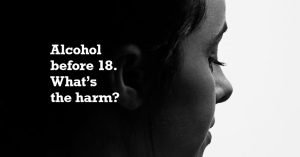North East parents urged to talk to their children about alcohol
- Warning that giving children alcohol undermines 18 age of sale laws
With exams over and summer holidays on the horizon, Balance and partners are warning parents about the risks of providing teenagers with alcohol.
Balance, police and local authorities are encouraging parents to think twice about giving drinks to children which can harm their health and undermine 18 plus age of sale laws which protect children’s safety and local communities from disorder
It comes as Balance launches the What’s the Harm? campaign, aimed at giving parents information about the risks of under-age drinking and encouraging families to think twice about providing alcohol.

What’s the Harm campaign image
Drinking during the childhood years increases the risks of accidents, injuries, smoking and drug taking, and can affect their mood and mental health. Regular drinking also increases the risk in adulthood of cancer, including breast and bowel cancer
Research shows around 70% of alcohol drank by children comes from the family home. Evidence suggests that drinking in childhood is more likely to give them a taste for it and lead to heavier drinking as adults.
Chief Medical Officer (CMO)’s guidance recommends that an alcohol-free childhood up to 18 is the healthiest and best option, and that if children do drink it should not be before age 15.
Susan Taylor, Head of Alcohol Policy for Balance, said: “Every parent wants what is best for their child and we have seen over the last couple of years the devastating impact of alcohol on both physical health and mental health.

Susan Taylor, Head of Alcohol Policy for Balance
“Nobody wants to think their child might be the one getting drunk, taking risks, having an accident or getting into a situation they can’t handle. But the reality is that too many local children are ending up in hospital, in A&E or with real problems in their lives because of alcohol.
“As parents, we can have a role in encouraging our children to delay the onset of their drinking – however, it can be really challenging to protect them when alcohol is so cheap, available and heavily promoted. Many children are exposed to alcohol from the moment they are born and grow up in an environment where it is hugely visible in supermarkets, on social media, at events, celebrations and in countless other scenarios. This is why we also desperately need support from the Government, in the shape of an evidence based national alcohol strategy, which tackles the normalisation of alcohol in our society, and which addresses its price, promotion and availability.”
Alice Wiseman, Director of Public Health for Gateshead and Alcohol Policy Lead for the Association of Directors of Public Health, said: “There are lots of good reasons why the law prohibits under 18s from buying alcohol, but unfortunately, we know that this doesn’t prevent children and teenagers from drinking – as most of the alcohol consumed by this age group comes from the home.

Alice Wiseman, Director of Public Health for Gateshead and Alcohol Policy Lead for the Association of Directors of Public Health
“Parents want what’s best for their children and it’s understandable that many people believe that allowing alcohol in small quantities and safe settings promotes a responsible approach to drinking. However, even small amounts of alcohol can affect the physical and mental health of young people and those who drink at a young age are more likely to become heavy drinkers as adults, smoke, use drugs and take other risks. An entirely alcohol-free childhood is the safest and healthiest choice and I’d encourage all parents to talk to their kids and make sure they understand the reasons for this.”
Northumbria Violence Reduction Unit Director, Steven Hume said: “The North East is a phenomenal place to live and work and we want to make sure it remains a safe place too. That is why we are taking such a radical approach to tackling the root causes of violent crime, in order to reduce the risks for those most vulnerable.
“We have a dedicated education team and have recently launched our new drugs and alcohol awareness session, which has been co-produced with young people. The session addresses the myths around drugs and alcohol, why young people can feel pressured to experiment, the impact it can have on their health and how to keep themselves safe.
“I applaud the What’s The Harm campaign, as it is vitally important that we educate our young people to provide them with the knowledge to make positive decisions for the future.”
County Durham and Darlington Police and Crime Commissioner, Joy Allen, said: “I fully support this campaign and its important message to parents about the health and social risks of consuming alcohol before adulthood.
“Our licensing officers in Durham work very hard to enforce age of sale laws to protect children and promote community safety. By condoning or supplying alcohol to their children, even in what is perceived as a safe, family environment, parents are unintentionally undermining these efforts and putting their children at increased risk of harm physically and emotionally.
“The evidence is very clear; alcohol can impact the developing body and brain and contribute to low mood, depression and anxiety. Parenting teenagers is always a challenge however I would urge parents to hold open and honest conversations with their children around alcohol and discourage under-age drinking as best they can to help keep them healthy and safe and keep communities safe.”
To find out the facts and the myths people can visit Whatstheharm.co.uk and download the free Parents Guide which can help parents have a conversation with their child about alcohol.
Alcohol and children: the facts:
Chief Medical Officer advice for parents is that an alcohol-free childhood is the healthiest and best option. However, if children drink alcohol, it should not be until at least the age of 15. If young people aged 15 to 17 years drink alcohol, it should always be with the guidance of a parent or carer or in a supervised environment.
Drinking, even at age 15 or older, can be hazardous to health. Children who drink increase their risk of involvement in a wide range of health and social problems.
Alcohol can affect all the different systems in the body and the fact that children’s organs are still developing can make them particularly vulnerable. We know that drinking alcohol can affect their liver, bones, hormones and even their growth. Children are smaller, which means alcohol’s effects work more quickly on them in the short-term. Alcohol poisoning can result in young people being admitted to hospital or worse.
Young people are not immune to the chronic diseases and conditions associated with excess alcohol consumption in adults, and deaths from liver disease are now occurring at younger ages.
Alcohol may increase feelings of depression. There is a relationship between adolescent alcohol use and mental health problem, as well as low mood and motivation which can affect performance at school.
Children who drink regularly are also more likely to smoke and take illegal drugs, have accidents and be involved in risk taking behaviours.
